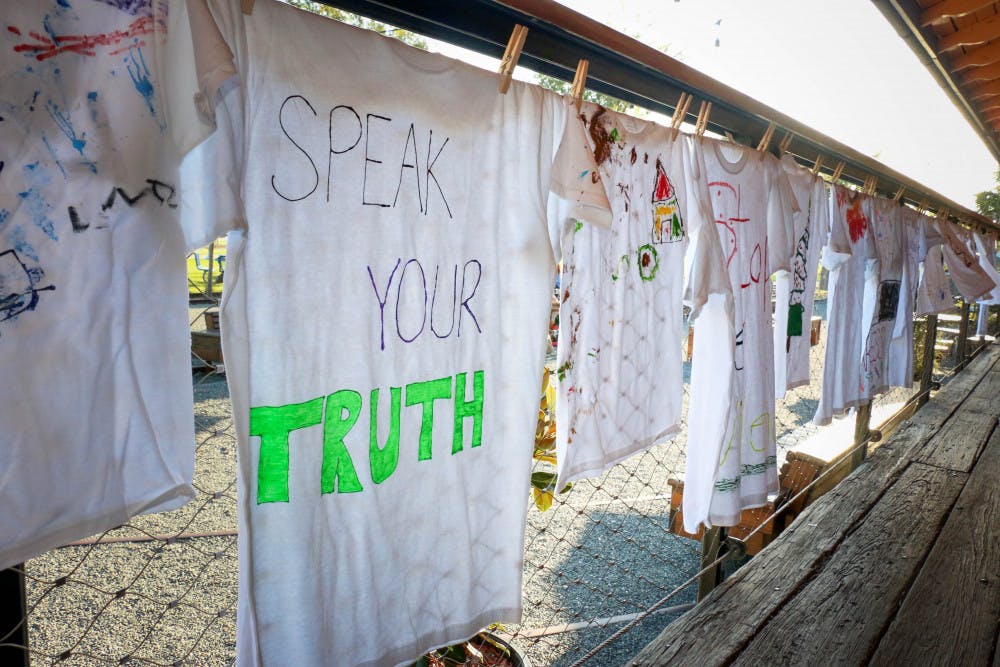Editor’s note: If you or someone who know is experiencing domestic violence, please call Peaceful Paths for the organization’s 24/7 helpline at 352-377-8255 or its outreach center at 352-377-5690. You can also call the United Way Help Hotline at 211. To report child abuse, please call 1-800-962-2873. Cases can also be reported online at https://reportabuse.dcf.state.fl.us/Child/ChildForm.aspx.
COVID-19 has the state and Alachua County urging people to stay home. But domestic violence victim advocates are worried this could leave many stuck at home with their abusers.
At a telephone town hall March 26, Gainesville Mayor Lauren Poe said there’s recently been an uptick in domestic violence and child abuse calls in Alachua County. Art Forgey, a spokesperson for the Alachua County Sheriff’s Office, told The Alligator that while data shows a small spike, he anticipates a significant increase in the coming weeks.
However, he said it’s too early to tell if the uptick is correlated to the county’s stay-at-home order, which has been in place since late March. Last week, Gov. Ron DeSantis declared a statewide stay-at-home order.
The statewide order requires local orders to use the same guidelines for businesses as outlined in the state’s list of essential services. In Alachua County, only one person is allowed per every 1,000 square feet in these locations, including places of worship. Gatherings are restricted to 10 people and under.
There have been 474 reported domestic abuse cases in the county during the last three months –– an increase of 18 calls compared to the same time last year, Forgey said. He said he did not have access to the number of reported child abuse cases.
Alachua County isn’t alone. Domestic abuse has risen around the world since the beginning of lockdowns because of COVID-19.
Florida has the third-highest estimated number of domestic violence victims in the U.S., following Texas and California, according to the U.S. Centers for Disease Control and Prevention.
“There are more opportunities with kids being home now for that abuse to happen,” Forgey said. He added that there’s usually a rise in reported violence and abuse when people stay home, such as during the holidays.
Although the sheriff’s office is limiting arrests, it will continue to make arrests in crimes such as murder, rape and abuse, he said. Officers are working with the Florida Department of Children and Families to investigate any reports of child abuse.
The department has not witnessed an increase in domestic violence victims seeking assistance recently, Aly Coleman, a department spokesperson, wrote in an email.
“However, emergencies and disasters often increase the frequency of violence by abusive partners, including isolating victims from family, friends, and support systems,” Coleman wrote.
The number of child abuse reports in Florida decreased from 26,113 in February to 23,080 in March, Coleman wrote. She noted that reports are lower when children are on break from school because they don’t see their teachers, who are required to report child abuse.
For former victims of domestic abuse like Abigail-Ann Hartwick, increased time at home from COVID-19 is concerning.
Hartwick, 29, was pregnant in Minnesota when she was physically abused for the first time, she said. She was driving when her abuser slammed the brakes of the car, smashing her into the dashboard.
The abuse, which became verbal after she gave birth to their first child, eventually evolved into kicking, shoving and pushing. It continued for six years until Hartwick took a leap of faith, escaping her abuser and driving to Gainesville with her children to begin a new life.
“I can’t even explain why it took six and a half years to draw that line,” Hartwick said.
The county sheriff’s office refers victims to services such as Peaceful Paths where they can seek help, Forgey said.
Theresa Beachy, the executive director of Peaceful Paths, a local domestic violence support network agency, said about 60 victims reaching out to the network for legal assistance during March when COVID-19 began to reach the area. With this jump from the monthly average of 52 for legal assistance, she expects an average of 225 calls a month to the agency’s helpline to rise by about a quarter as well.
On April 1, a woman was battered into a medically induced coma by her boyfriend, Elmer R. Cortes, according to a Gainesville Police arrest report. Cortes is accused of beating the victim after she told him she cheated, telling police he was concerned with being infected by COVID-19.
Beachy fears incidents like these will happen more often because the situation with COVID-19 can give abusers power and control over their victims.
The North Central Florida-based domestic abuse agency offers crisis counseling, emergency sheltering, support groups and legal assistance, Beachy said. Given the recent increase in domestic violence incidents, the organization is fully staffed on a rotational basis to help victims with housing.
“We want to make sure that victims understand they are not alone during this crisis,” she said.
Contact Grethel Aguila at gaguila@alligator.org. Follow her on Twitter @GrethelAguila.
Forty-nine shirts lined the walkway at Depot Park on Oct. 4, 2018, during the Domestic Violence Community Vigil and Clothesline Project Exhibit. The Clothesline Project began in 1990 and was created to honor survivors of domestic violence and educate others about the reality of abuse. The shirts were decorated by women and children who survived domestic violence.






